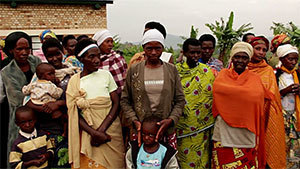The genocide in Rwanda, whose 20th anniversary is being observed worldwide this month, began only a few days after Easter. That the hatred that cost the lives of a million people in this overwhelmingly Christian country could be unleashed so near to Holy Week seems paradoxical, ironic or even blasphemous.

But for Jean Bosco Rutagengwa, it is most of all a searing mystery. “This country went through what Jesus Christ went through,” he said of his homeland. “Life, death and resurrection.”
Rutagengwa and his wife, Christine, survived the killing 20 years ago, taking refuge in the Hôtel des Mille Collines (the subject of the 2004 film “Hotel Rwanda”). Now residents of Nashua, N.H., and the parents of University of Notre Dame freshman student Christine Rutagengwa, they returned to Rwanda last December.
The Rutagengwas joined a team of Notre Dame theologians and others led by Rev. Daniel Groody, C.S.C., associate professor of theology and director of the Center for Latino Spirituality and Culture at Notre Dame, to make a short film, “Return to Rwanda: A Journey of Hope.”
“We went to Rwanda to enter into both the history of the events of the genocide and the challenges they present to all of us, especially as we search to know the God who is present among us in the Incarnate Word,” Father Groody said. “We are still looking for the best venues to disseminate the film, but for now we wanted to get it out by the 20th anniversary of the genocide in order to remember the victims and provide a space for people to tell their story. As the events of the genocide happened around the time of Holy Week 20 years ago, we hope it will also be an occasion today to remember all those who suffered such tragedies, and to reflect on both the difficult questions and the faith that emerge from this context.”
Other members of the team, all of whom stayed at the Hôtel des Mille Collines during their visit, were Rev. Virgilio P. Elizondo, professor of pastoral and Hispanic theology, and Colleen Cross, project coordinator of Notre Dame’s Institute for Latino Studies.
“Our research in Rwanda emerged from the desire to understand human life and God’s presence within it, from contexts of acute vulnerability, among the poor and suffering, among those who are crucified today,” Father Groody said. “Jesus himself lived and ministered and walked amid such contexts, and theologically speaking, such margins are places of great revelation.”
According to Father Groody, “the Rutagengwas asked us to walk with them in the search to understand where God was in the context of genocide. The golden thread of such research is to try to understand the dynamics of how people believe amidst such unbelievable circumstances, how they find hope amidst such hopeless situations, and how they find strength to trust in God amidst the evil of genocide. In all of this, it is a process of faith seeking understanding from the context of human suffering and the search to find the seeds of resurrection as they burst forth amidst the darkness of our world today.”
Father Groody’s research in Rwanda was funded by Notre Dame’s Kellogg Institute for International Studies and the Institute for Scholarship in the Liberal Arts.
Contact: Colleen Cross, 574-631-8396, ccross@nd.edu